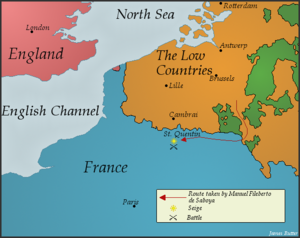Battle of St. Quentin (1557)
| Battle of St. Quentin | |||||||
|---|---|---|---|---|---|---|---|
| Part of the Italian War of 1551–1559 | |||||||
 Map of Manuel Fileberto de Saboya's Dutch campaign. |
|||||||
|
|||||||
| Belligerents | |||||||
|
|
|
||||||
| Commanders and leaders | |||||||
|
|
|
||||||
| Strength | |||||||
| 60,000-80,000 | 26,000 | ||||||
| Casualties and losses | |||||||
| 1,000, or as few as 57 | 3,000 killed and 7,000 captured or 14,000 or 15,000 casualties, 16 cannons, 50 flags and 60 banners | ||||||
The Battle of Saint-Quentin of 1557 was fought at Saint-Quentin in Picardy, during the Italian War of 1551–1559. The Spanish, which is to say the international forces of Philip II's Spanish Empire, who had regained the support of the English whose Mary I of England he had married, won a significant victory over the French at Saint-Quentin, in northern France.
The battle took place on the Feast Day of St. Lawrence (10 August). Spain, now under the rule of Philip II, was allied with England following Philip's marriage to the queen of England, Mary I. Mary had declared war on France, 7 June 1557.
At the Battle of St. Quentin the French forces under Constable Anne de Montmorency were overwhelmed, and Montmorency was captured by the forces under the command of the Duke Emmanuel Philibert of Savoy and the Count of Egmont in an alliance with English troops, and the French were defeated. During the fighting the Saint-Quentin collegiate church was badly damaged by fire.
After the victory over the French at St. Quentin, "the sight of the battlefield gave Philip a permanent distaste for war"; he declined to pursue his advantage, withdrawing to the Spanish Netherlands to the north, where he had been the Governor since 1555. The Treaty of Cateau-Cambresis ended the war two years later.
...
Wikipedia
